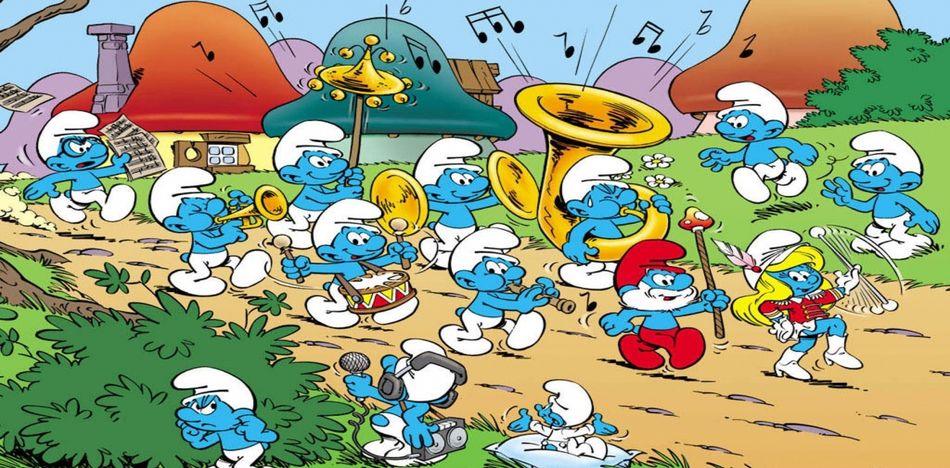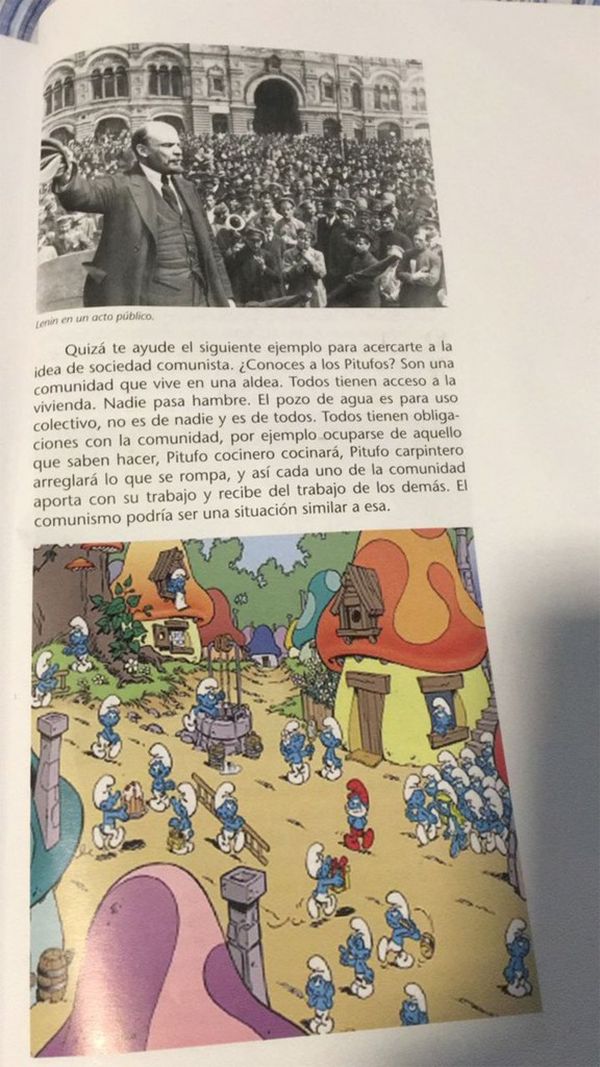
EspañolA sixth grade textbook shows the author’s sad comparison between Communism and the Smurfs. And while it’s just one page out of a middle schooler’s career, the implications are massive.
The text reads as follows:
“Perhaps the following example will help you to understand the idea of a communist society. Do you know the Smurfs? They are a community that lives in a village. They all have access to housing. No one goes hungry. The water well is for collective use, it is not for anyone specifically bur rather belongs to everyone. Everyone has obligations to the community. For example, one Smurf will cook, one Smurf is a carpenter and fixes what breaks, and so each of the community contributes with their work and receives from the work of others. Communism could be a situation similar to that. ”
This is happening in Uruguay today. We aren’t talking about crazy old texts. This is the Uruguay of the 21st century, the Uruguay of the “moderate left” that so many praise.
- Read More: Ecuador President Denies Corruption in Oil Sales to China
- Read More: US Sanctions Venezuelan Vice President Tareck El Aissami for Drug Trafficking
It is clearer, however, that the left has never learned the meaning of the term “moderation” and that in fact “left” (whether in its communist or socialist forms) and “moderation” contradict and nullify each other.
As if it were a kind of attenuation, and cornered by the resulting controversy, Counselor of Initial and Primary Education Hector Florit said the text is used only in private schools, adding that “texts used by private institutions are not subject to censorship or control.” He admitted, however, that the comparison is “unfortunate.”
I have trouble believing Mr. Florit. It is almost impossible for me to think that private schools have so much freedom, particularly since I have worked in private institutions a good part of my teaching career and I know that these schools must comply, perhaps more than their public peers, with regulations.
But even if Florit is being honest, we should not be any less alarmed. This is still a very clear example of brainwashing.
Perhaps the scariest defense of the text came from Director of the publishing house Adriana Fernandez, who referred to the book as “excellent” and “super-objective.”

This is not the first time in Uruguay that we have faced such ideology.
We saw a similar episode from the publisher Santillana in 2015. Its text, which was geared toward high school students, affirmed that “neoliberalism” is a “school of economic thought” for which “neither priorities nor justice nor freedom nor equality” are priorities.
“The neoliberals or neoconservatives took up the idea that the state should not intervene in the economy, that the ‘great regulating agent’ is the market, ‘the invisible hand’ and ‘private initiative.'” But the names behind this series of huge lies are Leonor Berna, Pablo Lignone and Silvana Pera!
The book also says that neoliberalism “was applied in Uruguay, first by the military dictatorship (1973-1985) and then by the first governments that succeeded it, directed by the Colorado and National parties, whose status as democratic is in question. ”
In other words, it dismisses the validity of fully democratic governments. I wonder what the authors’ reasons are for extending their “judgment.” Were they not leftist governments?
The Frente Amplio and his serfs are convinced they invented the country. Nothing exists outside the Frente Amplio, not even democracy itself. The Frente Amplio does not respect democracy.
It rips apart secularism as much as the Soviet Union did, and washes as many brains as Castro. Let’s be clear: it is not possible, nor is it ethical to minimize the seriousness of this episode.
We must not believe that the Frente Amplio is against the ideas that soak the pages of these books. One need only read President Vázquez’s statements from Germany last week: “In Venezuela there is democracy.”
Uruguayans, keep believing you are the moderate, and that you are the exception. Just look away and believe nothing bad comes of our government that has become an accomplice to hunger and torture.
Neither book mentions the millions of lives that communism has taken and is still carrying with it. None of the books makes the slightest reference to the fate of the opposition during communism.
None of them imply that Communism is more than just a comic. And oh how I wish it were only that.
 Versión Español
Versión Español












